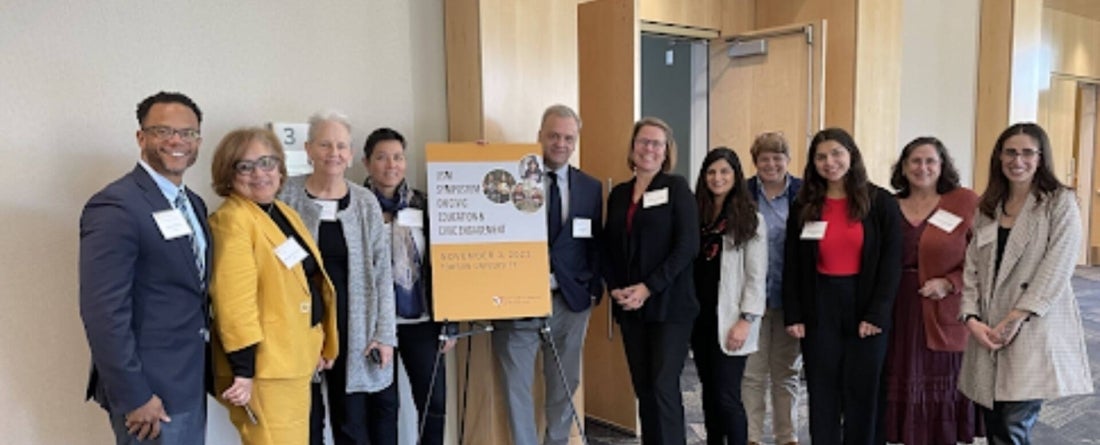
Maryland is a nationally recognized leader in efforts to promote better civic and service learning outcomes for students in preschool through higher education. Two members of the Maryland Democracy Initiative (MDI) team actively worked to build and strengthen that leadership in recent national and state civic conferences.
Lena Morreale Scott and Paul Brown attended Democracy360, a late-October democracy and civic engagement conference hosted by the Karsh Institute of Democracy at the University of Virginia. They were invited to represent Maryland by Civic Learning for an Engaged Democracy (CLDE), a national coalition of education and policy organizations committed to making college students’ civic learning for an engaged democracy a priority across higher education and in public policy.
Scott, director of the Civic Education & Engagement Initiative at UMD’s College of Education and co-chair of the Maryland Civic Education Coalition, spoke at a session entitled “In Search of Crosswalks: Connecting the K-12 and Postsecondary Civic Learning Movements”. Scott joined a panel discussion with other national leaders in civics, including Danielle Allen, Ace Parsi, Stephanie van Hover, University System of Maryland’s Nancy Shapiro and moderator Martha Kanter, CEO of College Promise. Scott spoke about how, as Maryland’s flagship university, University of Maryland College Park is connecting civic learning and democracy engagement across the curriculum and across the ages. This is evident in pre-K–12-grade schools through its activities and advocacy for the statewide Maryland Civic Education Coalition and in higher education through the interdisciplinary Maryland Democracy Initiative.
“If we want to prepare and inspire people to become life-long participants in our shared democracy, we need to connect the research, scholarship and lived experiences of people in the K-12 and higher education communities. We need to infuse civic knowledge and skills across majors and across the curriculum because a healthy democracy depends on all of us. Some students find their civic purpose and agency through the arts, engineering or health, not in typical “civics” courses. When we offer more “on ramps” and “crosswalks” we can impact a broader cross-section of students to transform our communities and our democracy for good,” said Scott.
Brown, associate clinical professor and director of the Civic Innovation Center at the University of Maryland School of Public Policy, is a member of CLDE’s policy committee. He updated representatives from other states about the University System of Maryland’s activities to collaborate for better civic learning in higher education across the University System of Maryland.
Scott and Brown were also involved in the planning of the University System of Maryland’s “Symposium on Civic Education and Civic Engagement” at Towson University on November 3. The symposium included teams from all of USM’s 12 institutions. Provost Rice and Vice President for Student Affairs Patty Perillo selected members of UMD’s team. Scott and Brown attended as UMD College Park representatives and as members of the symposium’s planning committee appointed by Associate Vice Chancellor for Education and Outreach Nancy Shapiro.
“The University System of Maryland is in the vanguard of civic learning and higher education and continues to be a great platform for sharing best practices and engaging in collaborative scholarship. We recognize that not all states enjoy the supportive leadership and favorable political climate that we have to address the challenges that students face when engaging in civic life and learning. So we take our responsibility seriously as Maryland’s flagship institution to join and share what we have and to learn from and support others doing this work across our diverse state,” said Brown.
The symposium featured a fireside chat with Maryland’s senior U.S. Senator Ben Cardin; a keynote from the new Secretary of Maryland’s Department of Service and Service Learning Paul Monteiro; a student panel discussion moderated by USM Regent Michelle Gourdine; closing remarks by Director of the Maryland 250 Commission Michele Johnson; and workshop sessions on the Carnegie Classification for Community Engagement, Election & Voter Engagement; Integrating Civic Learning Across the Curriculum; and Service Learning as a High-Impact Practice.
Scott was a featured speaker at the Integrating Civic Learning Across the Curriculum session and was chosen to introduce keynote Secretary Monteiro. Brown helped plan and co-facilitate the Election & Voter Engagement workshop, introducing and facilitating discussion with Adam Gismondi, director of the National Study of Learning, Voting and Engagement at Tufts University.
Both of these conferences serve as building blocks for continued collaboration. Brown and Scott will continue to advise and consult with Shapiro and other partners within USM to broaden and deepen the impact of high-quality civic learning in the state’s public higher education system and to lift Maryland as a national leader in teaching for democratic engagement.
